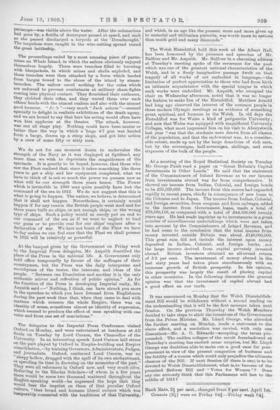The Welsh Eisteddfod, held this week at the Albert Hall,
has been honoured by the presence and speeches of Mr. Balfour and Mr. Asquith. Mr. Balfour in a charniing address at Tuesday's meeting spoke of the reverence for the past which was one of the greatest national characteristics of the Welsh, and in a finely imaginative passage dwelt on that tragedy of all works of art embodied in language,—the limitation of perfect appreciation to those who had from birth an intimate acquaintance with the special tongue in which such works were embodied. Mr. Asquith, who occupied the ' chair on Wednesday afternoon, noted that it was no longer the fashion to make fun of the Eisteddfod. Matthew Arnold had long ago observed the interest of the common people in ' these modern Olympic meetings as an evidence of something great, spiritual, and humane in the Welsh. In old days the Eisteddfod was for Wales a kind of peripatetic University ; and now that Wales was equipped with magnificent University Colleges, what most impressed him on his visit to Aberystwith last year "was that the students were drawn from all classes of the population, and that the endowment was, to a consider-, able extent, made up not by the 'large donations of rich men, but by the sovereigns, half-sovereigns, shillings, and even sixpences of the bulk of the people.










































 Previous page
Previous page